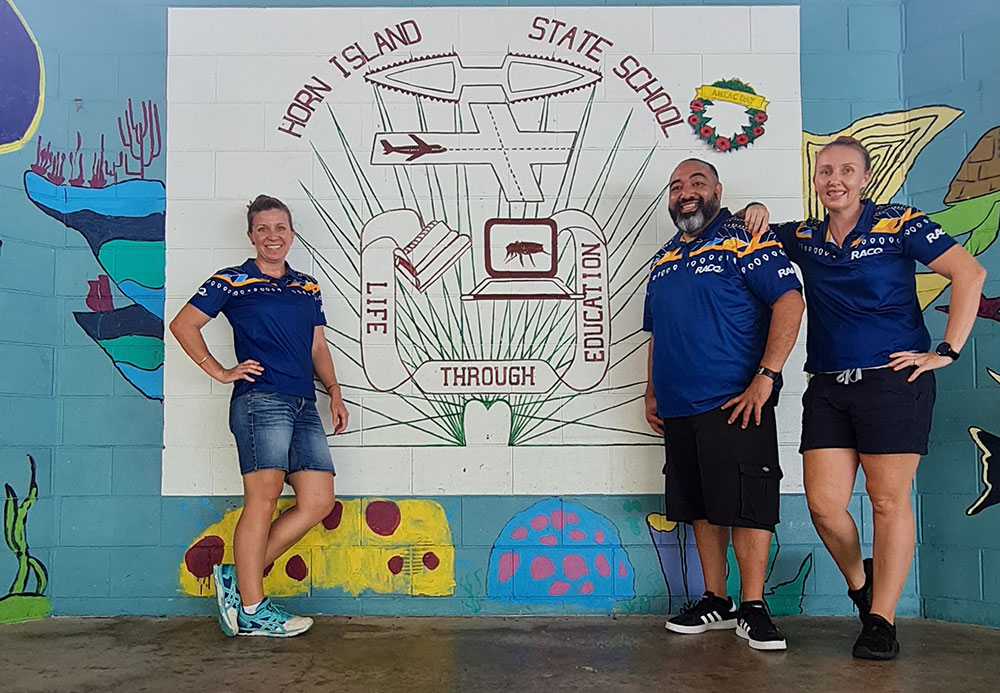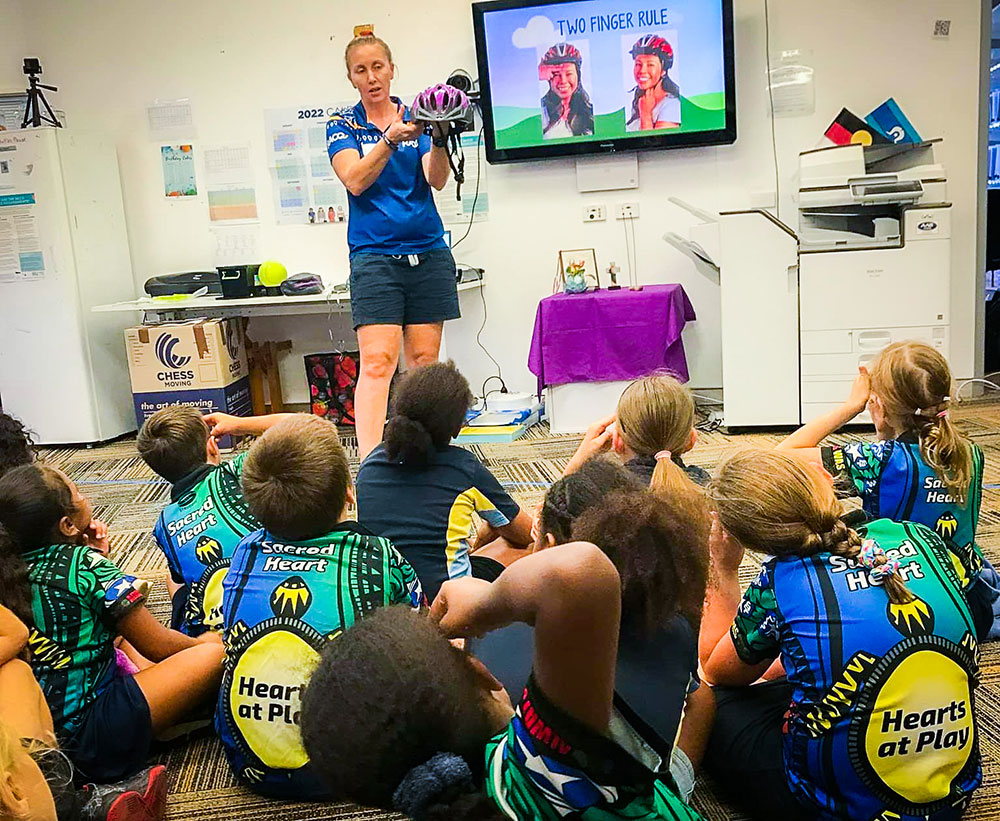Distance is no barrier for Education Team

For the first time, RACQ’s Education Team has travelled to the tip of Queensland to teach school students on Torres Strait islands about road and ferry safety.
This is the farthest north the team has travelled, delivering its award-winning road safety programs on Hammond, Horn and Thursday islands.
RACQ’s Education Manager Rhonda McKenzie said the Education Team had expanded its suite of school programs (including Streets Ahead, Driver IQ, Docudrama and Cash IQ) to more regional areas of the state than ever before.
“In the last financial year, we have taught more than 53,000 students across Queensland,” Mrs McKenzie said.
“We have reached students from Texas in the south up to the Torres Strait islands in the far north.
“We have also travelled north-west to Mornington Island, west to Winton and south-west to Thargomindah and Quilpie.
“Every day our team is empowering students in both primary and secondary grades to make better and informed choices as road users.
“Our mission is to teach ‘all and often’ to give every student an equal opportunity to learn about road safety, regardless of location.”

RACQ Education Specialist Janelle Baker with students at Our Lady of the Sacred Heart School's Thursday Island campus.
While the programs are designed to educate students on how to be safe drivers, passengers, riders and pedestrians, the team has been able to specifically modify these to better suit students who live in regional towns.
“We understand that young Queenslanders face different geographic and socio-economic environments, which is why we are flexible with our education strategies,” Mrs McKenzie said.
“When we teach in regional and remote locations, we are responsive to the students’ needs – teaching them about safe riding, which can extend to dirt bikes, quad bikes and horses.
“We have also introduced education on ferry, boat and dinghy safety for students living on our islands where water is their main form of transport.”
The team has also successfully trialled the RACQ Docudrama Virtual Classroom, designed to teach high school students about road safety topics (including the Fatal Five) online.
“All children, adolescents and young people across Queensland are vulnerable road users who need support, guidance and skills to make decisions that will keep them safe on and around the road,” Mrs McKenzie said.
“The creation of these online resources will revolutionise the scope of what our Education team can accomplish in the road safety and education space.
“Distance is no barrier for us, we can now teach anywhere in the state.
“None of this important work would be possible without the support of our RACQ members and the funding we receive from a Department of Transport and Main Roads Community Road Safety Education Grant.”
Related topics
Things to note
The information in this article has been prepared for general information purposes only and is not intended as legal advice or specific advice to any particular person. Any advice contained in the document is general advice, not intended as legal advice or professional advice and does not take into account any person’s particular circumstances. Before acting on anything based on this advice you should consider its appropriateness to you, having regard to your objectives and needs.
Insurance Products (excluding Travel Insurance) are issued by RACQ Insurance Limited ABN 50 009 704 152 (RACQI) and arranged by its agent, RACQ Distribution Services Pty Ltd (RDS) ABN 35 116 361 650, AFSL 567130 and RDS' authorised representatives (including RACQ Operations Pty Ltd ABN 80 009 663 414, AR No. 234978 (RACQO). Conditions, limits and exclusions apply. RDS and RACQO are in the RACQ group of companies. One of the companies in the RACQ group of companies has a minority shareholding in RACQI.
RDS and RACQO have not taken your personal objectives, circumstances or needs into account when preparing advice regarding insurance products and you will need to consider whether the advice is appropriate for you. Read the Product Disclosure Statement (PDS) and any applicable Supplementary PDS before making a purchase decision on this product. You can also access our Target Market Determinations on this website. RDS receives a commission from RACQI for the policies it arranges. RACQO receives fees paid for services it provides to RDS. Further details about remuneration are available on request prior to purchasing.
Banking and loan products issued by Members Banking Group Limited ABN 83 087 651 054 AFSL/Australian credit licence 241195 trading as RACQ Bank. Terms, conditions, fees, charges and lending policies apply. This is general advice only and may not be right for you. This information does not take your personal objectives, circumstances or needs into account. Read the disclosure documents for your selected product or service, including the Financial Services Guide and the Terms and Conditions, and consider if appropriate for you before deciding.
Except for RACQ Bank, any RACQ entity referred to on this page is not an authorised deposit-taking institution for the purposes of the Banking Act 1959 (Cth). That entity’s obligations do not represent deposits or other liabilities of RACQ Bank. RACQ Bank does not guarantee or otherwise provide assurance in respect of the obligations of that entity, unless noted otherwise.
RACQ Bank subscribes to the Customer Owned Banking Code of Practice which establishes higher standards than the law requires. The Code reflects modern consumer expectations and developments in approaches to issues such as consumer vulnerability, guarantors, and supporting customers through financial hardship. Please read our Customer Owned Banking Code of Practice page for more information.
RACQ Operations Pty Ltd (ABN 80 009 663 414 AR 000234978) and Members Travel Group Pty Ltd (ABN 45 144 538 803 AR 000432492) are acting as an Authorised Representative of the issuer of the insurance, Tokio Marine & Nichido Fire Insurance Co., Ltd. (ABN 80 000 438 291 AFSL 246 548). Any advice set out above is general in nature only, and does not take into account your objectives, financial situation or needs. Before purchasing any travel products, please consider the RACQ Travel Insurance Product Disclosure Statement (PDS) and the Target Market Determinations (TMDs) that apply to these products. Whilst the PDS outlines the Terms and Conditions of these products, the TMDs outline the intended class of customers that comprise the target market for these travel products. This will allow you to consider which products best suit your objectives, financial situation and needs and consider the products appropriateness to your personal circumstances. TMDs also outline matters involving the distribution and the review of these products. The PDS, Supplementary PDS and TMDs for each travel product can be found here.

